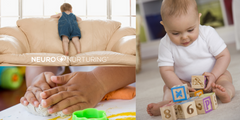What is good for the body... is good for the brain!
Often when we hear the term "healthy" we generally think in terms of our body. However, realizing the positive impact healthy habits have on our brains and the dramatic effect they have on children can make a remarkable difference.
When presenting on the effects nutrition has on a child's brain, learning and behavior, I commonly find that people are amazed with this knowledge. For this reason, I share this wonderful article written by Lauren Zimet which was originally published in Common Ground Magazine.
I have had the wonderful pleasure of co-presenting with Lauren. She is a dedicated, knowledgeable and passionate professional who is making a positive impact for numerous children.
Enjoy the valuable Neuro-Nurturing tips she provides for the benefit of healthier brains not only for children, but for yourself as well.
Nourishing Tips to Nurture New Neurons
By Lauren Zimet, M.S. CCC/SLP
The brain. We all have one. Yet sometimes it gets neglected. Our brain needs certain things to stay healthy, and when it doesn’t get what it needs, it doesn’t work its best. In fact, sometimes it gets the opposite of what it needs—stuff it doesn’t know what to do with, such as artificial dyes, preservatives, GMOs, the list goes on. When this happens, both our brain and body can have a sensitive reaction that can look different from one person to the next, but that can result in a brain not performing to its highest standard.
We are born with 100 billion brain cells, and the brain continues to develop after a baby is born. New connections between neurons—the cells in the brain—form quickly from birth to 3 years of age and older, and continue to form throughout our lives, based on our experiences.This means that we need to nourish our brain. We need to give it both the experiences and the nutrients it needs to develop.
It helps children to know that with each healthy food they eat, and with each new experience they have, they are making a new connection in their brain. This is powerful. Imagine a child's face filled with pride, after making a new neural connection by simply taking a nibble of kale.
The following seven tips offer simple ways you can guide children in making mindful, brain-healthy choices as they play, learn, work, and grow.
- Eat a rainbow. Eat a colorful array of organic fruits and vegetables every day. Be sure to wash the produce to loosen and rinse away any dirt and toxins. Kids can do the washing. they benefit from being part of a team, by having their own chores within the family.
- Don’t eat fake stuff. The body and brain really like food. Real food such as whole grains, protein, lots of colorful vegetables, fruit and healthy fats. Limit or eliminate artificial dyes, colors and flavors; processed foods; fast foods; junk foods; hydrogenated fats; sodas; and refined sugars.
- Keep your brain lubed. Your brain needs omega-3s, also known as essential fatty acids (EFAs), for proper growth, particularly for neural development and maturation of sensory systems. EFAs speed neural signals along, making for smoother, easier, more efficient communication across brain connections. EFAs are necessary for proper immune function, cognitive development, and for skin function and maintenance. A deficit in EFAs has been linked to ADHD, dyslexia, and other behavioral or psychological disorders. Your body doesn't make EFAs, so you need to consume them. They are found in nuts, seeds, olives, seaweed, and fish. It is always best to eat foods that contain vitamins, minerals and other essential nutrients, but if you are unsure that your child is getting a well-balanced diet, a purified, molecularly distilled fish oil supplement is a great EFA source.
- Stay awash in oxygen and water. Drink H2O to hydrate. Check with your health care practitioner for how much, but a quick rule is to divide body weight by two to get the approximate number of ounces to drink per day. Also, take slow, deep breaths to reset and calm the sensory and neurological system. Deep breathing helps children self-regulate and improves immunity, nervous system functioning, and emotional regulation. A study published in the International Journal of Nursing Studies reports that deep breathing is effective for reducing anxiety in children with asthma.
- Learn to move and to chill. The brain loves exercise, and exercise boots brain power. But you also need to teach your child how to relax. Examples: getting out into nature, reading an entertaining book, or playing a board game. Long-term stress can be toxic, and a stressed brain doesn't learn the same way as an unstressed brain. Emotional stress has an impact on a child's ability to learn. Sustained stress can damage a the architecture of the developing brain, which can lead to problems in learning, behavior, and physical and mental health.
- Rewire your thinking. Create “Band-Aid thoughts" as a tool to acknowledge and work through bad, sad, mad, frustrated and negative thoughts. Demonstrating positive self-talk in front of your children for example, reflecting on how you expertly handled a difficult or challenging situation, lays a blueprint for how they may handle their own problems. Negative thoughts or mistakes can be opportunities used as opportunities to learn and grow.
- Name that feeling. Teaching your child to label emotions and recognize feelings helps connect the nonverbal and verbal pathways in the brain. Strengthening these pathways can improve a child's ability to take on the perspective of another person. This is especially useful for children with learning challenges, who need more support developing flexible thinking.
 Lauren Zimet, M.S.,CCC/SLP serves as the Director of Skills Development at Perspectives , overseeing the Early Insights Program and The Powerful Project. Lauren is licensed as a speech, language and early communication specialist. She is certified in Neuro-Developmental Training (NDT), certified as a Natural Health Care Practitioner, is a certified parenting coach, and is a registered Better Brains for Babies (BBB) trainer. Lauren has over 2 decades of professional experience in the helping fields.
Lauren Zimet, M.S.,CCC/SLP serves as the Director of Skills Development at Perspectives , overseeing the Early Insights Program and The Powerful Project. Lauren is licensed as a speech, language and early communication specialist. She is certified in Neuro-Developmental Training (NDT), certified as a Natural Health Care Practitioner, is a certified parenting coach, and is a registered Better Brains for Babies (BBB) trainer. Lauren has over 2 decades of professional experience in the helping fields.
For additional benefit click here for a printable to share more tips and valuable insights toward supporting healthy brains! Particularly interesting to many, is the influence of simple carbohydrates on moods, behavior, and attention.

Of course the Neuro-Nurturing Interaction Packets provide you with the easiest way to support healthy brains during busy everyday life! ENJOY!




Be the first to comment